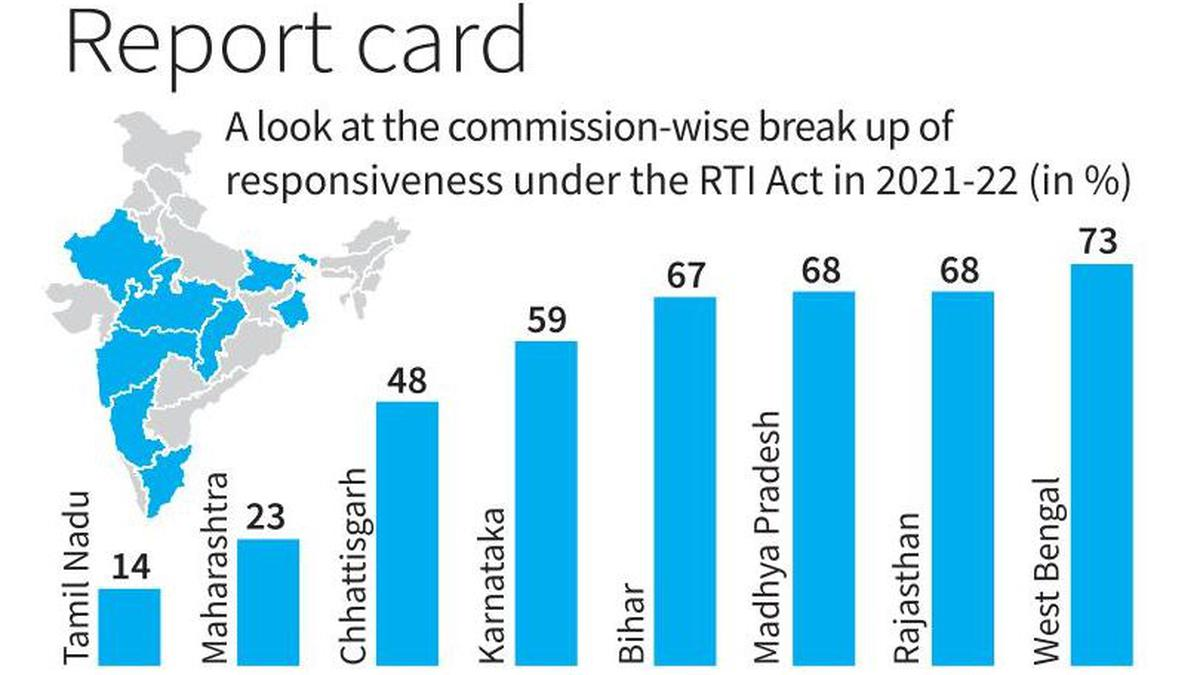Governance
Report Card of RTI Responsiveness
- 30 Dec 2022
- 8 min read
For Prelims: Right to Information (RTI) Act, Central Information Commission, SIC, Satark Nagrik Sangathan.
For Mains: Right to Information (RTI) Act, Transparency & Accountability.
Why in News?
Recently, Satark Nagrik Sangathan (SNS) has released a report card of Responsiveness under RTI (Right to Information) Act 2021-22, which shows that Tamil Nadu has been the worst performing RTI responsiveness, furnishing only 14% of the information sought.
What are the Key Highlights of the Report Card?
- Maharashtra was second-worst, sharing 23% of the information asked for.
- Only 10 ICs provided full information in response to the RTI applications filed as part of this assessment. These included Andhra Pradesh, Haryana, Jharkhand and northeastern States of Sikkim, Nagaland and Tripura.
- The SIC of Bihar, which had failed to provide any information under the RTI Act for the assessments published in 2020 and 2021, significantly improved its performance and furnished 67% of the information sought.
- A large number of ICs across the country were returning cases without passing orders.
- Uttar Pradesh and Andhra Pradesh returned around 40% of the appeals or complaints received by them.
- Of the 18 Information Commissioners the assessment found that 11 had returned appeals or complaints without passing any orders.
- Several ICs have an extremely low rate of disposal per commissioner.
- For instance, the SIC of West Bengal had an annual average disposal rate of 222 cases per commissioner - each commissioner effectively disposing of less than one case a day - even though more than 10,000 cases were pending.
- Of all the 29 ICs, only the CIC has adopted a norm regarding the number of appeals or complaints to be disposed of by each commissioner in one year.
What is the Right to Information (RTI) Act?
- About:
- The Right to Information Act 2005 mandates timely response to citizen requests for government information.
- The basic object of the Right to Information Act is to empower the citizens, promote transparency and accountability in the working of the Government, contain corruption, and make our democracy work for the people in a real sense.
- Right to Information (Amendment) Act, 2019:
- It provided that the Chief Information Commissioner and an Information Commissioner (of Centre as well as States) shall hold office for such term as prescribed by the Central Government. Before this amendment, their term was fixed for 5 years.
- It provided that the salary, allowances and other service conditions of the Chief Information Commissioner and an Information Commissioner (of Centre as well as States) shall be such as prescribed by the Central Government.
- Before this amendment, the salary, allowances and other service conditions of the Chief Information Commissioner were similar to those of the Chief Election Commissioner and that of an Information Commissioner were similar to those of an Election Commissioner (State Election Commissioners in case of States).
- It removed the provisions regarding deductions in salary of the Chief Information Commissioner, an Information Commissioner, the State Chief Information Commissioner and a State Information Commissioner due to pension or any other retirement benefits received by them for their previous government service.
- The RTI (Amendment) Act, 2019 was criticized on grounds of diluting the law and giving more powers to the central government.
- Issues in the Implementation:
- Non-compliance in proactive disclosure by public authorities
- Hostile approach of Public Information Officers (PIOs) towards citizens and misinterpreting provisions of the Right to Information (RTI) Act to conceal information.
- Lack of clarity on what public interest is and right to privacy
- Lack of political will and poor infrastructure
- Rejection of information requests made by active citizens on important matters of public importance
- Covert means of attacks and threats against RTI activists and applicants to suppress their voices
What is the Central Information Commission?
- Established: The Central Information Commission was established by the Central Government in 2005, under the provisions of the Right to Information Act (2005). It is not a constitutional body.
- Members: The Commission consists of a Chief Information Commissioner and not more than ten Information Commissioners.
- Appointment: They are appointed by the President on the recommendation of a committee consisting of the Prime Minister as Chairperson, the Leader of Opposition in the Lok Sabha and a Union Cabinet Minister nominated by the Prime Minister.
- Tenure: The Chief Information Commissioner and an Information Commissioner shall hold office for such term as prescribed by the Central Government or until they attain the age of 65 years, whichever is earlier.
- They are not eligible for reappointment.
- Power and Functions of CIC:
- It is the duty of the Commission to receive and inquire into a complaint from any person regarding information requested under RTI, 2005.
- The Commission can order an inquiry into any matter if there are reasonable grounds (suo-moto power).
- While inquiring, the Commission has the powers of a civil court in respect of summoning, requiring documents etc.
Way Forward
- Proper functioning of information commissions is crucial for people to realise their right to information.
- Under the RTI law, information commissions are the final appellate authority and are mandated to safeguard and facilitate people’s fundamental right to information.
- There is an urgent need for the transparency watchdogs to function in a more effective and transparent manner.
- The digital RTI portal (website or mobile app) can deliver more efficient and citizen-friendly services which are not possible through conventional mode.
- This will be beneficial for both transparency seekers and the government.
UPSC Civil Services Examination, Previous Year Question (PYQ)
Q. The Right to Information Act is not all about citizens’ empowerment alone, it essentially redefines the concept of accountability.” Discuss. (2018)







